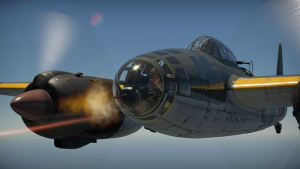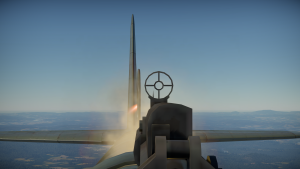Type 99 Model 1 (20 mm)
| This page is about the Japanese cannon Type 99 Model 1 (20 mm). For the other version, see Type 99 Model 2 (20 mm). For other uses, see Type 99 (Disambiguation). |
Contents
Description
The 20 mm Type 99 Model 1 is a Japanese aircraft cannon, one of the most commonly used by the IJN. It can be found on the defensive turrets of quite a few bombers, as well as many early fighters. The cannon is on par with those of other nations, and it has a decent damage potential while having a low rate of fire.
While all Type 99s are labeled as simply Type 99 Model 1 (and Type 99 Model 2), there are variants between them that mainly only reflect in ammo count:
- Type 99 Model 1, Mark 1 - (30 - 45 - 60 rds Drum) Initial gun with 60 rds drum mag feeding from the top.
- Type 99 Model 1, Mark 2 - (30 - 45 - 60 rds Drum) Inverted feeding so drum mags could be inserted from beneath, allowing for gunner line-of-sight.
- Type 99 Model 1, Mark 3 - (100 rds Drum) Increased drum size.
- Type 99 Model 1, Mark 4 - (125 - 250 Belt) Switched out to a belt-fed system making the gun heavier.
Vehicles equipped with this weapon
| Vehicles equipped with this weapon | |
|---|---|
| Type 99-1, Mark 1 | |
| A6M2 | A6M2 mod. 11 · A6M2 · ␗A6M2 · ▃A6M2 · A6M2-N |
| G5N | G5N1 (Defensive) |
| H8K | H8K2 (Defensive) · H8K3 (Defensive) |
| Type 99-1, Mark 2 | |
| G4M | G4M1 (Defensive) |
| G5N | G5N1 (Defensive) |
| H6K | H6K4 (Defensive) |
| H8K | H8K2 (Defensive) · H8K3 (Defensive) |
| P1Y | P1Y1 mod. 11 (Defensive) · ␗P1Y1 mod. 11 (Defensive) |
| Type 99-1, Mark 3 | |
| A6M3 | A6M3 · A6M3 mod. 22 |
| N1K | N1K1 |
| Type 99-1, Mark 4 | |
| J2M | J2M3 · J2M4 Kai · J2M5 |
General info
The Type 99 cannons are a bit tricky to use compared to German, Russian, or American counterparts. They have an extremely low rate of fire, of 450 rounds per minute, and poor velocity as well. Furthermore, the stock belts for these cannons are incredibly poor. However, these downsides come with advantages. These cannons have lots of explosive filler, especially in the Universal belt. They are potent WW2 cannons, due to the 12 grams of TNT inside the rounds. Moreover, the seemingly small ammo count is actually made copious by the cannons' low rate of fire.
These cannons are always mounted in the wings of fighters. As a result, you will need to set your gun convergence to 300 m or so, as these guns have low velocity. The guns are really good for dogfighting, as they are best used up close, as many Japanese aviators say.
Available ammunition
- Offensive
- Default: T · HEF-I · HEF-I · APHE
- Universal: HEF-T · HEF · HEF · APHE
- Ground targets: APHE · APHE · APHE · APHE · HEF · HEF-T
- Tracers: HEF-T
- Stealth: HEF · HEF · HEF · APHE · APHE
- Defensive
- Default: T · HEF · APHE
- Armoured targets: HEF-T · APHE · APHE · APHE · APHE
- Air targets: HEF · HEF-T · HEF · APHE · HEF-T
| Penetration statistics | |||||||
|---|---|---|---|---|---|---|---|
| Ammunition | Penetration @ 0° Angle of Attack (mm) | ||||||
| 10 m | 100 m | 500 m | 1,000 m | 1,500 m | 2,000 m | ||
| APHE | 19 | 17 | 12 | 7 | 5 | 3 | |
| T | 11 | 8 | 6 | 4 | 0 | 0 | |
| HEF-I | 3 | 2 | 2 | 2 | 2 | 2 | |
| HEF-T | 3 | 2 | 2 | 2 | 2 | 2 | |
| HEF | 3 | 2 | 2 | 2 | 2 | 2 | |
| Shell details | ||||||||||||
|---|---|---|---|---|---|---|---|---|---|---|---|---|
| Ammunition | Velocity (m/s) |
Projectile mass (kg) |
Fuse delay (m) |
Fuse sensitivity (mm) |
Explosive mass (TNT equivalent) (g) |
Ricochet | ||||||
| 0% | 50% | 100% | ||||||||||
| APHE | 588 | 0.13 | 0 | 0 | 4.84 | 47° | 60° | 65° | ||||
| T | 588 | 0.13 | - | - | - | 47° | 56° | 65° | ||||
| HEF-I | 588 | 0.13 | 0.3 | 0.1 | 5 | 79° | 80° | 81° | ||||
| HEF-T | 588 | 0.13 | 0.3 | 0.1 | 6.05 | 79° | 80° | 81° | ||||
| HEF | 588 | 0.13 | 0.3 | 0.1 | 11.98 | 79° | 80° | 81° | ||||
Comparison with analogues
Compared with guns like the MG 151, the Type 99 cannons are no match. However, these cannons have better damage output than most cannons of other nations. However, there is still ongoing debate regarding the Ho-5, Japan's land based fighter standard cannon. The Ho-5 performs consistently better than the type 99, as the Ho-5 is mounted in the nose, has double the rate of fire, and is excellent at sniping pilots. However, Ho-5's have poor ammo count, so the type 99 is better for pilots who want consistent, steady, slow damage.
Difference Between the Model 1 and Model 2
The Type 99 model 2 cannon is arguably better than the model 1. Although it has a lower rate of fire, the Model 2 cannon has really good belts that rip through enemy fighters. The model 2 also has improved accuracy, due to the longer barrel of the cannon.
Usage in battles
The cannon is very useful in close range dogfights, as the rounds usually rip a wing off very quickly. It is quite easy to land shots with these cannons. The Tracer Rounds (HEF-T) only have half the explosive mass of the standard (HEF) round. Tracers do not give good damage output for this reason, and the more viable belt would be Universal, or Stealth.
Pros and cons
Pros:
- HEF has wonderful damage output
- Universal belt can shred opponents in a short burst when well aimed
- Useful in close range dogfights, combined with turn and burn tactics
Cons:
- Low velocity
- Low rate of fire
- Ammo count is meagre
- HEF-I ammo lacks damage output results in a painful stock grind
- Low penetration thus ineffective in a ground attack role
- Poor as a defensive turret, cannot reliably down pursuing fighters
History
Examine the history of the creation and combat usage of the weapon in more detail than in the introduction. If the historical reference turns out to be too long, take it to a separate article, taking a link to the article about the weapon and adding a block "/History" (example: https://wiki.warthunder.com/(Weapon-name)/History) and add a link to it here using the main template. Be sure to reference text and sources by using <ref></ref>, as well as adding them at the end of the article with <references />.
Media
Excellent additions to the article would be video guides, screenshots from the game, and photos.
See also
External links
| USA aircraft cannons | |
|---|---|
| 20 mm | AN/M2 · Browning-Colt Mk12 Mod 0 · Browning-Colt Mk12 Mod 3 · FMC T-160 |
| M3 · M24A1 · M39 · M39A1 · M39A2 · M39A3 · M61A1 · M195 · M197 · Mk 11 · Mk 11 mod 5 · T31 | |
| 30 mm | M230E-1 · XM140 · GAU-8/A · GAU-13/A · LR30 |
| 37 mm | M4 · M9 · M10 |
| 40 mm | M75 · M129 |
| 75 mm | M10 · T13E1 |
| Foreign: | |
| 20 mm | Hispano 404 (France) · Hispano Mk.II (Britain) · MG 151 (Germany) · Type 99 Model 1 (Japan) |
| 30 mm | ADEN Mk.4 (Britain) |
| Japan aircraft cannons | |
|---|---|
| 20 mm | Ho-1 · Ho-3 · Ho-5 · Type 99 Model 1 · Type 99 Model 2 |
| 30 mm | Ho-155 · Type 5 |
| 37 mm | Ho-203 · Ho-204 · Type 94 |
| 40 mm | Ho-301 |
| 57 mm | Ho-401 |
| 75 mm | Type 88 |
| Foreign: | |
| 20 mm | M39A3 (USA) · M61A1 (USA) · M197 (USA) · MG FF (Germany) · MG FF/M (Germany) · MG 151 (Germany) |
| 30 mm | GAU-13/A (USA) · M230E-1 (USA) |
| China aircraft cannons | |
|---|---|
| 23 mm | Type 23-1 · Type 23-2K · Type 23-3 · Type 23L |
| 30 mm | Type 30-1 |
| Foreign | |
| 20 mm | AN/M2 (USA) · B-20E (USSR) · Hispano 404 (France) · Hispano Mk.II (Britain) · Ho-3 (Japan) · Ho-5 (Japan) |
| M39A1 (USA) · M39A2 (USA) · M39A3 (USA) · M61A1 (USA) · M197 (USA) · ShVAK (USSR) · Type 99 Model 1 (Japan) | |
| 23 mm | NR-23 (USSR) · NS-23 (USSR) · NS-23K (USSR) |
| 30 mm | GAU-13/A (USA) |
| 37 mm | Ho-203 (Japan) · N-37D (USSR) |





